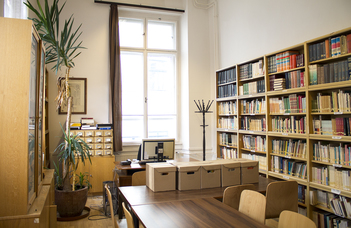About the department
ELTE Department of Portuguese Language and Literature

About
The Department of Portuguese Language and Literature is part of the Institute of Romance Studies, located in Building C of the Trefort Campus, neighbouring other Romance departments. Currently, five Hungarian lecturers, a Portuguese lector and another lector from Brazil make up the teaching staff, supported by a librarian and an administrator. The department hosts the Camões Institute, the Galego Language Centre, the Brazilian Centre and the local Centre for the Community of Portuguese-Speaking Countries. The department also includes a library, with a separate library housed in the Camões Language Centre.
Teaching
The department carries out educational activities on the following levels: bachelor’s (BA), master’s (MA), minor, undivided teacher training and doctoral programmes. The undergraduate programme is in the field of Portuguese within the broader scope of Romance languages and cultures. Prospective students are not required to know Portuguese upon entry, as the programme starts at beginner level. By the end of the three years, as students are expected to reach C1 language proficiency level, a strong emphasis is placed on language instruction, along with literature, linguistics and cultural studies, in order to provide foundational knowledge. In the first year, instruction is primarily in Hungarian, transitioning to Portuguese later. Students write and defend their theses in Portuguese, choosing one of three fields: language, literature or culture.
In addition to the bachelor’s programme, students are required to complete another educational module, meaning students from other programmes can enrol in the Portuguese minor. BA students majoring in Portuguese may also pursue the Iberian Romanic specialisation, which includes studies in Catalan and Galician language, literature, linguistics and culture. In the master’s programme, students can refine their Portuguese language skills and deepen their knowledge in the fields of Portuguese literature, linguistics and cultural studies. The teacher training programme prepares students to become secondary school teachers, where they study a second major alongside Portuguese.
The department’s courses cover not only language skills but also other disciplines, such as literature, linguistics and culture, shared with both undergraduate and graduate students. Additionally, there are specialised methodology courses in Portuguese. The department oversees the teaching practice for future educators. Upon completing the master’s or teacher training programmes, students may choose to pursue a PhD, with a focus on a specialised field of research while producing a high-quality doctoral thesis. The department’s PhD programme (Portuguese Literatures: History of Prose Fiction) is part of the Doctoral School of Literary Studies, while students interested in linguistics may join the Doctoral School of Linguistics’ Romance programme.
Research
In addition to teaching, the department’s staff actively engage in research, with publications in literature, history, linguistics and teaching methodology. We encourage students to participate in research activities, and take part in our scientific workshop, aimed at motivating talented students to continue their studies in our master’s and doctoral programmes.
International relations
The department maintains extensive international relations. Some of these connections are fostered through the centres mentioned above and through our two native lecturers. Our visiting professors primarily come from Portugal and Brazil. Besides Portuguese, we also teach Galician, which is a minority language in Spain but linguistically closely related to Portuguese. Our Galego Language Centre is supported by the autonomous government of Galicia, the Xunta. Additionally, the department has Erasmus partnerships with several Portuguese universities, where our students can study for a semester. We also have Erasmus partnerships with several Central European universities with Portuguese departments.

